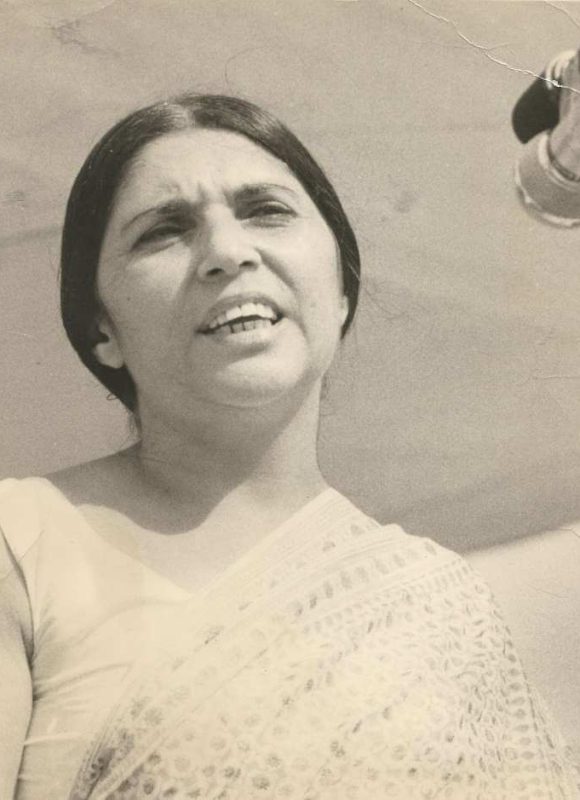PIONEER
Fatima Meer

Human rights activist | Women’s rights activist | Academic
Born: 12 August 1928 Died: 12 March 2010
“I lived in a South Africa which was full of challenges and I am grateful today that I more or less rose to the challenges. The challenges were our opportunities and we either grabbed those opportunities and ran with them or we were apathetic, turned our backs on them and lost out on what had been given to us.”
Who is
Fatima Meer?
Founding member of the Federation of South African Women (FEDSAW) and the Institute of Black Research (IBR), as well as founding several educational institutions and serving as an advisor to the ANC on arts, culture, science and technology.
Professions
and Roles
Author, artist, academic, educator, human rights and gender activist, anti-apartheid struggle leader.
Best Known For
Instrumental role in cementing the relationship between the Indian Congress and African National Congress (ANC), along with her husband Ismail Meer.
Life highlights
- Meer’s political activism started early: when she was 16 years old, she helped raise £1 000 for famine relief in Bengal.
- Meer completed her Bachelor’s and Master’s degrees in Sociology at the University of Natal.
- In 1946, Meer established the Student Passive Resistance Committee to support the Indian Passive Resistance Campaign. She was invited to speak at some of the mass rallies and share the platform with prominent anti-apartheid leaders.
- In 1949, Meer helped to establish the Durban District Women’s League, which aimed to build alliances between Africans and Indians as a result of the race riots. She became the secretary of the League soon after.
- In 1952, Meer was among those banned under the new Suppression of Communism Act, for a period of three years. The banning order confined her to the district of Durban, and prohibited her from attending public gatherings or having her work published.
- In 1955, Meer became a founding member of FEDSAW.
- In 1956, Meer started lecturing sociology at the University of Natal. She would be a member of staff there until 1988.
- In 1972, Meer founded the IBR, which became the leading black-run research institution and publishing house in the country.
- In 1975, Meer was served with another five-year banning order. In 1976, her son was detained after the 1976 student riots, and nine days later she was also detained with members of the Black Women’s Federation. She served a six-month detainment without trial, with large periods of time served in solitary confinement.
- Shortly after her release in 1976, she survived an assassination attempt when her house was petrol-bombed.
- In 1979, Meer established the Tembalishe Tutorial College to train students in secretarial skills, as well as a Crafts Centre. However, both centres were closed in 1982, when Meer was arrested for contravening her banning order.
- In 1986, Meer started Phambili High School for African students, with an enrolment of 3 000 students. In 1993 she would also found the Khanyisa School Project, as a bridging programme for African children from informal settlements.
- In 1994, Meer declined an offer for a seat in Parliament. However, she served the ANC government as an adviser to the Minister of Arts, Culture, Science and Technology; she served on the National Symbols Commission and the National Anthem Commission. Furthermore she was a member of the Advisory Panel to the President.
- Meer immersed herself in projects focusing on education, social work, and poverty alleviation after 1994.
IN THEIR OWN WORDS
“The major point I would say is the new sense of self that you see projected in the black communities particularly among the African people. That sense was not there before. African people do not any longer feel a sense of inferiority, they have conquered that almost miraculously overnight. We also find that white people generally are far more subdued and they have done away with their previous arrogance of being white and therefore on top of things. I think that’s the major change. It’s sort of a psychological change.”
– Fatima Meer, 1996
“I lived in a South Africa which was full of challenges and I am grateful today that I more or less rose to the challenges. The challenges were our opportunities and we either grabbed those opportunities and ran with them or we were apathetic, turned our backs on them and lost out on what had been given to us.”
– Fatima Meer
IN THE WORDS OF OTHERS
“Both Fatima and Ismail were part of the core of the ANC that defied the segregationist ideology of the oppressive regime of the time that forced our organisation to be splintered into the Indian Congress, the Congress of Democrats, the Coloured People’s Congress and the African Native Congress. They were very active in forming an inclusive organisation that finally gave birth to our present democracy, the African National Congress.
[…] Fatima’s dedication and commitment to the ANC were almost an obsession. I personally felt she deserved more recognition than she was given. But, of course, ours is still a patriarchal society, in which men are more recognised than women.”
– Winnie Madikizela-Mandela, South African activist
“The way Fatima has lived her life has served as an inspiration to a whole generation of activists, intellectuals, politicians, students and ordinary South Africans intent on challenging successive criminal, exploitative and oppressive apartheid regimes. Even after the onset of democracy in 1996 which saw a rapid demobilization of the structures of civil society (due to the euphoria and heightened expectations of the time) that had previously resisted tyranny, Fatima fearlessly continued her outspoken, sometimes controversial and frank critique of those in power. Speaking truth to power became her hallmark from very early on in her life.”
– Dasarath Chetty, Visiting Professor at Kindheiten Gesellschaften Wuppertal University
Parliament of the Republic of South Africa (2018) Theme Committee Book Series 1-6
http://subrygovender.blogspot.com/2017/08/by-subry-govender-fatima-meer-struggle.html
https://www.sahistory.org.za/archive/nomzamo-winnie-madikizela-mandela-fatima-meer
https://www.ukzn.ac.za/wp-content/miscFiles/publications/F%20Meer.pdf
